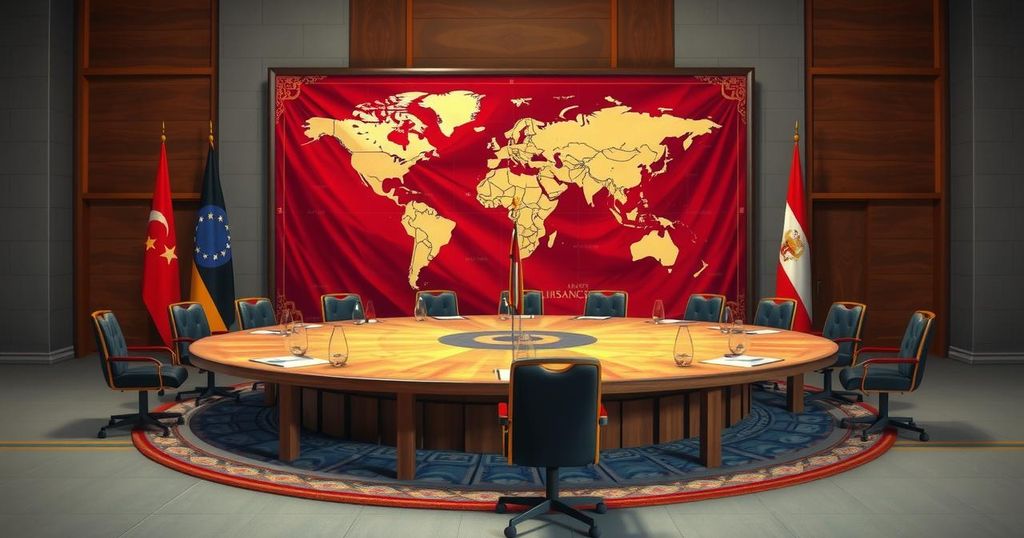A significant meeting between Russian security chief Sergei Shoigu and North Korean leader Kim Jong Un highlighted North Korea’s support for Russia amid the Ukraine conflict. Shoigu expressed gratitude for this support and reaffirmed security cooperation commitments. Discussions encompassed various strategic topics, including troop deployments and regional security, amid heightened tensions from recent military exercises by the U.S. and South Korea.
On Friday, a senior Russian security official, Sergei Shoigu, met with North Korean leader Kim Jong Un in Pyongyang. This meeting included expressions of gratitude from Shoigu regarding North Korea’s support for Russia’s military efforts in Ukraine, as reported by Russian state media. This dialogue occurs amidst reports that North Korea has sent additional troops to assist Russia’s operations in the ongoing conflict.
During the encounter, Shoigu conveyed a message from President Vladimir Putin, who emphasized his commitment to focusing on the implementation of prior agreements made during their recent summits. Shoigu expressed appreciation for North Korea’s alignment with Russia’s geopolitical stances, particularly concerning the situation in Ukraine.
Furthermore, Shoigu reaffirmed Russia’s readiness to honor a security cooperation agreement established at a previous summit in Pyongyang, which commits both nations to mutual support in the event of aggression. The discussions, lasting over two hours, also touched on various strategic topics, including Moscow’s communications with the Trump administration and regional security dynamics in the Korean Peninsula.
Reports indicate no new agreements were announced following the meeting. Shoigu’s visit coincides with a recently proposed ceasefire agreement between Ukraine and Russia, which emerged after discussions with President Trump, although the specifics regarding the ceasefire remain unclear.
North Korea has been reportedly supplying considerable conventional arms to Russia and had previously deployed approximately 10,000 to 12,000 troops to assist in Russia’s efforts. Recent intelligence suggests that North Korea may have dispatched additional forces, estimated at 1,000 to 3,000 soldiers, to aid Russia further.
Concerns exist that North Korea may be receiving military and economic aid from Russia in exchange for its support in troop and weapon deployments. Analysts suggest that North Korea will likely continue to bolster its support for Russia to maximize benefits before the war concludes.
Shoigu’s trip may also be connected to a possible visit from Kim to Russia, a prospect anticipated since Putin’s invitation to Kim following their major mutual defense treaty signing in June 2024. Previously, Shoigu had engaged in visits to North Korea that have included meetings focused on enhancing military cooperation.
Earlier on Friday, North Korean state media reported that Kim oversaw the recent flight tests of new anti-aircraft missiles, labeling this development as a significant advancement in North Korea’s defense capabilities. These missile tests coincide with the conclusion of extensive U.S.-South Korean military exercises, which North Korea perceives as hostile preparations.
North Korea has issued warnings of serious consequences should the U.S. and South Korea continue their military drills, claiming they simulate attacks against North Korean assets. The atmosphere remains tense, particularly as South Korea urges restraint from North Korea in leveraging military exercises as a pretext for aggression.
Trump has expressed willingness to reconnect with Kim regarding nuclear diplomatic efforts; however, North Korea has not publicly responded to this overture. Experts opine that Kim’s current focus on supporting Russia’s military actions in Ukraine may hinder any immediate engagement with Trump’s diplomatic initiatives, though he may reconsider post-conflict.
In conclusion, the recent meeting between Sergei Shoigu and Kim Jong Un underscores the strengthening ties between Russia and North Korea amid ongoing conflict in Ukraine. As both nations navigate their strategic partnerships, North Korea continues to provide military support to Russia, while also developing its own defense capabilities amidst regional tensions. The complex geopolitical landscape illustrates the intertwining of military alliances and diplomatic efforts, especially in light of potential shifts in North Korea’s policies post-conflict.
Original Source: www.sooleader.com






